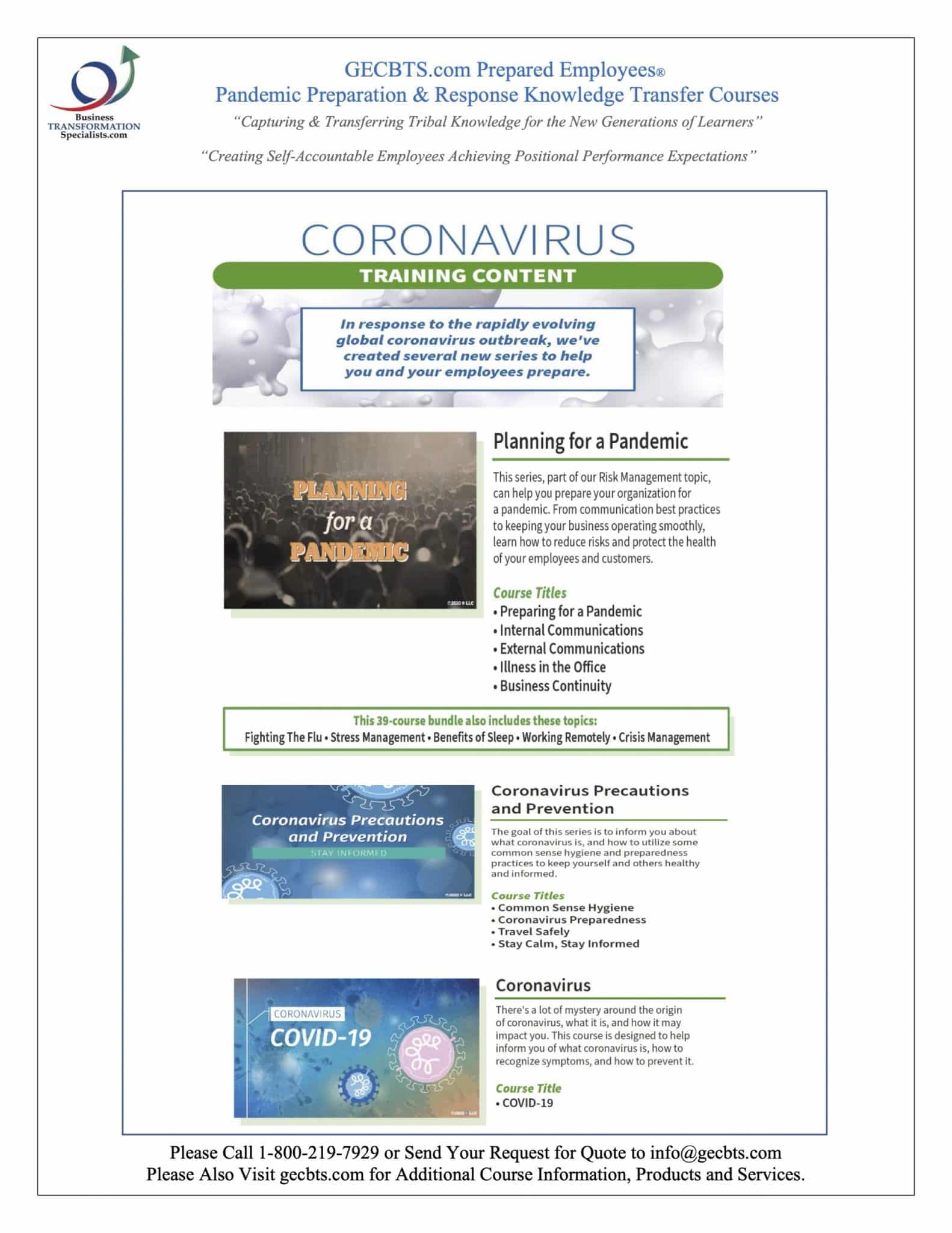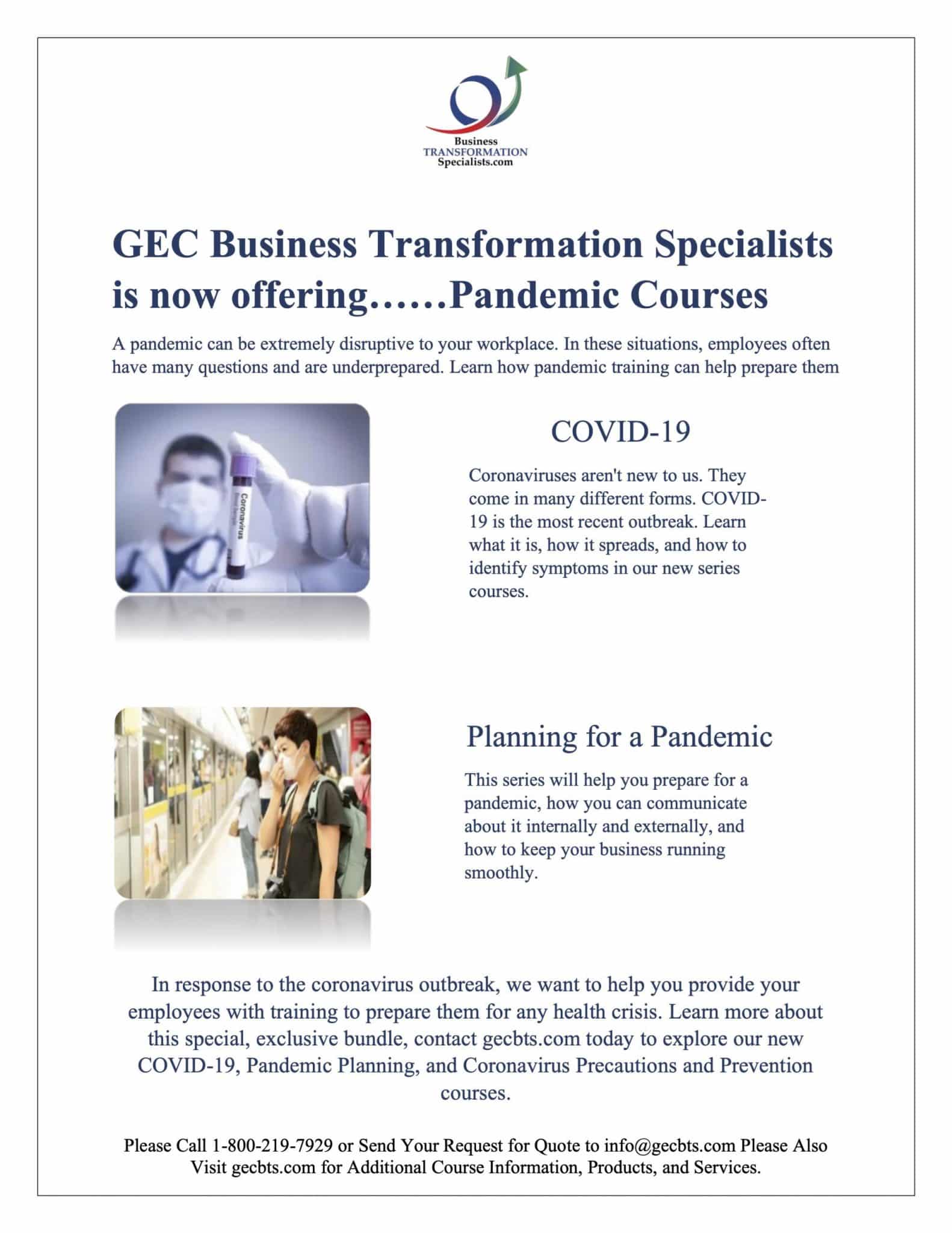GECBTS.com is in the process of releasing 39 Prepared Employees® courses as part of our Organizational Risk Management Series. The course curriculum and learning objectives are designed to help prepare your organization for current and future pandemics. The course series objectives are to communicate pandemics management and countermeasure best practices to ensure your organization remains synchronized during a pandemics crises. A few of the 39 course titles to be released include…
- Preparing for a Pandemic
- Internal Communications
- External Communications
- Illness in the Office
- Business Continuity
Please call GECBTS.com at 1-800-219-7929 or email info@gecbts.com for more information on how to access these vital planning and countermeasures courses immediately.
Below is helpful information and links for further knowledge on the subject.
Information about the coronavirus changes daily. Yahoo now has an entire tab dedicated to the topic in their navigation page. Fears of the spread of the virus shut down the Louvre Museum, as well as many other partial supply chain companies in just about every industry. Communicating coronavirus precautions to your employees effectively will help manage their fears so they can take preventive actions to be safe and give them, your clients and suppliers a peace of mind.
Coronavirus: COVID-19
Coronaviruses aren’t new. There are different types that can present with respiratory or gastrointestinal symptoms. COVID-19 is the infectious disease currently in the daily news. It is caused by the most recently discovered coronavirus when the outbreak began in Wuhan, China, in December 2019. In just three months it has progressed.
Similar to training employees to keep them safe from harassment in the workplace or working safely with forklifts and ladders, employers should be concerned with keeping employees safe from the coronavirus.
Put Things into Perspective
One way to manage fear is to be realistic about the threat. The first US death was recently reported in Washington State. Rhode Island confirmed its first case. It is still a new virus with no vaccine and no specific antiviral treatment. A new report says researchers suspect the virus has spread in the US for weeks undetected.
There are also misleading myths about the virus so it’s important to be informed. The coronavirus is being called a global crisis and you see governments, health organizations, business and community leaders all working on the rapid response to diagnose and treat those affected and keep our communities safe.
As of this writing, the WHO has not yet officially declared this to be a pandemic but they have also warned countries to prepare for the coronavirus pandemic. I think, just as we are trying to manage the fear and concern within our employee base, they are trying to manage fear and concern among the world’s population.
Training on Flu Prevention
According to Johns Hopkins Medicine, there are similarities in the symptoms of the flu and the coronavirus since they are both infectious respiratory illnesses. It is a great idea to provide employees with some additional training on common flu prevention. Our series on fighting the flu consists of five videos. The courses explain the symptoms, ways it’s spread, the different types of flu, prevention tips, when you should stay home, and the benefits of the flu shot.
Take Precautions for Prevention
According to the CDC, the best way to prevent illness is to avoid being exposed. Things like avoiding close contact with people who are sick; avoiding touching your eyes, nose, and mouth; covering your cough or sneeze with a tissue, then throw the tissue in the trash and wash your hands or use hand sanitizer gel.
Wash Your Hands
Another thing that should be a basic habit of personal hygiene and also a CDC recommendation is to wash your hands. They say to wash your hands often with soap and water for at least 20 seconds, especially after going to the bathroom; before eating; and after blowing your nose, coughing, or sneezing.
If you don’t have access to soap and water, use an alcohol-based hand sanitizer with at least 60% alcohol. We have made it a habit to carry this and disinfecting wipes with us at all times.
Clean and Disinfect
Another everyday habit that can help prevent the spread of several viruses is to clean and disinfect frequently touched objects and surfaces. Use a regular household cleaning spray or disinfecting wipe on surfaces like doorknobs, refrigerator handles, coffee makers, and meeting tables.
We encourage all employees take a week of kitchen duty in their cafeterias and community gathering places, as one of their responsibilities, to ensure an “all hands on deck prevention approach.” We also suggest frequent messages throughout the day/week for all employees to take a break and wipe down their desks, phones, keyboards, etc.
Be Flexible with Working from Home
The CDC also recommends you stay home when you are sick. If the work allows, offer your employees more flexibility to work from home if they feel they are sick and contagious with a cold, flu, etc. Again, this is a normal best-practice to limit the circulation of the common cold, flu, and coronavirus and can be reinforced by managers.
You may also need to create a plan for an emergency plan to work remotely that can apply to situations beyond the virus like natural disasters and dangerous weather. We have had several days of extreme winter weather this year.
We also offer a course on working remotely that may be helpful for employees new to this environment. We offer tips on creating an ergonomic workplace in your home, for managing interruptions, and general tips on communication and productivity.
Crisis Management Training
This may be the time to revisit your organization’s crises management policy, procedures and protocol, as well as the Pulse Learning® training and make sure all employees are aware of and trained in these updated pandemic and crises management protocols and processes. What is the process if one of your employees leading a major project and or an entire department is affected by a quarantine? Or one of your suppliers in Asia is shut down due to the virus in the community? What contingency plans do you have in place to mitigate the spread, while keep the supply chain and projects intact?
Coronavirus precautions on workplace operations may include limiting or restricting travel, not allowing visitors at work, adding a hiring freeze, conducting interviews over the phone or web, instead of face-to-face.
As the Chief Guidance Officer of GECBTS Prepared Employees® it is priority #1 to ensure our clients have the latest and best training available for their approach in managing this crisis. We encourage you and your employees to stay informed, keep calm, communicate effectively, and create contingency plans supported through continuous training, to mitigate both company and supply chain risks. In addition, GECBTS Prepared Employees® will be offering new courses to help your employees on future pandemic-coronavirus precautions and preventions. These courses will be available to your organization in the coming days.
Please call GECBTS.com at 1-800-219-7929 or email info@gecbts.com for more information on how to access these vital planning and countermeasures courses immediately.


